Nov 4, 2021
Does Rain Help Allergies?
4 minute read
They say that April showers bring May flowers. But we also like to say that April rain brings May pain. For seasonal allergy sufferers, pollinating trees that help our environment stay alive cause lots of discomfort.
But believe it or not, the flowers might not be the only thing causing an allergic reaction flare-up. In fact, the showers themselves might be the hidden factor behind your sneezing, itchy eyes, and persistent coughing.
So does a rainy day help or hinder allergy symptoms? Let’s find out.
Rain, Rain Go Away
On the one hand, rainy conditions can be a seasonal allergy sufferer's worst nightmare. This is because raindrops can take pollen particles from the air and spread them even further through the atmosphere when released in higher concentrations.
This causes the pollen particles to become smaller, letting them spread more quickly while simultaneously entering your system much more easily. This is awful news for those with asthma, as symptoms can become more aggravated due to excessive pollen counts in the air.
Plus, stormy conditions with high winds can easily whisk pollen through the air, spreading it around more easily. It’s a nightmare condition for those with the usual seasonal allergy.
Come Back Another Day
But on the other hand, rainy conditions may also be able to bring some relief. Get out your notebooks because it’s time for a meteorology lesson.
Humidity is the concentration of water vapor in the air. When humidity reaches a point of around 90-99%, there is a higher water concentration in the atmosphere than it can hold. The result is rain, which is the Earth’s way of dispelling that excess moisture and creating a balance back in the atmosphere.
When you go outside on a humid summer’s day, you probably notice that it feels heavy, sticky, and moist. This is actually when pollen counts tend to be lowest, as the moisture weighs down the pollen and prevents it from spreading through the air. So in a sense, when it rains, it makes it difficult for some pollen particles to spread.
Forecasting Your Fate
One of the best ways to combat seasonal allergies is by looking at the weather every day before you head outside. On days when the humidity is low, you’ll want to take extra precautions to help protect yourself against pollen molecules blowing in the wind. This means you’ll want to stock up on oral and nasal antihistamines.
And while humid weather generally means that your allergies won’t feel as bad, you'll still want to take an extra precaution. Humidity can cause your nasal cavities to swell, which can trigger nasal congestion and sinus pressure. That may feel a lot like allergies, despite it just being a byproduct of the frightful outside weather.
Additionally, humidity can increase the abundance of mold spores inside your home. Mold flourishes in damp and warm environments, and it’s a seriously inundating indoor allergy trigger. You may want to invest in a dehumidifier to keep your home’s relative humidity between 30% and 50%.
Wind Isn’t a Win
Pollen levels tend to be the most frustrating on hot, dry, and windy days. This is why most people see more severe seasonal allergy symptoms in the spring and autumn than in the summer, where it’s much more hot and humid.
If you’ve ever woken up to your car covered in tiny yellow specks, then you know what pollen looks like. And these tiny particles can be easily whisked into the air when high winds are running amok. Sunny days with high winds are usually the worst for allergy sufferers, rather than cloudy and rainy ones.
Rain Relievers
While you may not be able to do anything about the weather conditions that make your eyes water and your nose run, you can take some steps towards fighting back against mother nature herself.
First, it’s essential to keep yourself inside as much as possible on days when pollen counts are high. Try to keep your windows closed, and make sure you change out of your “outside” clothes when you return home from work or school so that you don’t get any pollen particles on your furniture.
If you need fast relief, antihistamine medications are your go-to. These work by inhibiting the production of a chemical called “histamine,” which your body produces to fight against foreign allergen invaders. Antihistamines can help reduce your allergy symptoms quickly. And if you want to stock up without breaking the bank, the Cleared shop is the place to be.
Or, you can always try to treat the underlying cause of the allergies themselves. SLIT, or sublingual immunotherapy, is an FDA-approved way to actually pinpoint the source of your allergies rather than just treating the symptoms. It works by gradually exposing your body to an allergen so that your body can adjust.
Something that amazing must cost an arm and a leg, right? With some of the lowest co-pays on the market, Cleared has grass pollen immunotherapy for as low as $25 with insurance. We’re going all-in on the pollen to make the world a more breathable place.
Clear Skies Ahead
Rain is a double-edged sword for those with seasonal allergies. Essentially, rain makes allergies worse because it can spread droplets of pollen throughout the air more easily. But on the other hand, high humidity weighs down pollen and makes it less traversable, so it has a lower chance of entering your airways.
The biggest threat to pollen is a hot, dry, and windy day where the particles can be easily whisked into the air. That’s why it’s important to stock up on antihistamines and other allergy supplements to make sure you’re comfortable.
Need a helping hand? Take a free allergy consultation with Cleared to get one step closer to an allergy-free life.
Sources:



